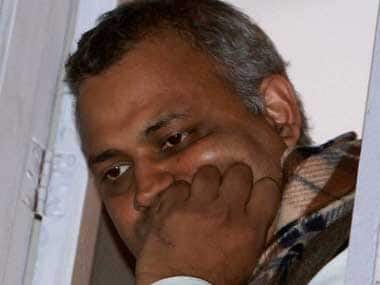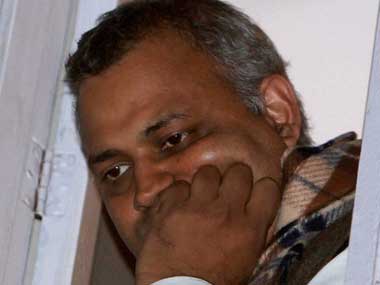The brazen acts and averments of Aam Aadmi Party (AAP) leaders with regard to African nationals has triggered a never-before seen side of the Ministry of External Affairs (MEA): the ministry turning political. Never before the MEA has so pro-actively taken upon a state government as it did in the case of Delhi Law Minister Somnath Bharti’s lawless acts against Ugandan and Nigerian women in Khirkee Extension on 15 January midnight.[caption id=“attachment_1357901” align=“alignleft” width=“380”]  Delhi Law Minister Somnath Bharti. PTI[/caption] There have been many situations in the past when a state government has thrown a spanner in the works of Indian diplomacy. Look at the anti-Bangladesh stance adopted by West Bengal Chief Minister Mamata Banerjee which scuppered the Land Boundary Agreement and Teesta accord with Bangladesh during Prime Minister Manmohan Singh’s crucial visit to Bangladesh in June 2011. Tamil Nadu has routinely and consistently adopted an anti-Sri Lankan stand cutting across the party lines. Tamil Nadu politicians from the ruling party as well as opposition have proudly exhibited anti-Sri Lankan stance, targeting even Sri Lankan cricketers. Arunachal Pradesh chief ministers, ministers and MLAs have repeatedly issued statements against China. Gujarat Chief Minister Narendra Modi has several times put the UPA government in a piquant situation by his acerbic comments on Pakistan. But the MEA has never reacted and taken on a state government like it has on the Delhi government for Somnath Bharti’s sins of omission and commission. This is a welcome move and the MEA needs to be complimented for charting a new course. Here is how and why. Bharti’s madness threatened to spoil India’s relations with the 54-nation African continent – the second largest and most populated continent which is important for India strategically and crucial for India’s bid for permanent membership of United Nations Security Council. The MEA reacted swiftly and determinedly to contain the diplomatic damage done by Bharti and his supporters. On 18 January, Dinkar Khullar, Secretary (West) in the Ministry of External Affairs, called a meeting of all African envoys in Delhi at the MEA headquarters in South Block. The significant thing here is that it is not the African envoys who reached out to the MEA in view of the Khirkee Extension incident but the other way round. Khullar used some very strong words to debunk Somnath Bharti’s actions and conveyed to the African envoys the Indian government’s view that the incident was utterly condemnable and could not be condoned. He assured the African envoys—there were thirty of them—that there was no deliberate targeting of the nationals of any country and the incident should be seen as an aberration. MEA spokesperson Syed Akbaruddin himself dealt with this exhaustively at his weekly briefing on 23 January. Sample his remarks: “Our relations with Africa are rooted in history, a history of a common opposition to colonialism and apartheid. Please let us not forget that the Father of the Nation Mahatma Gandhi honed his passive resistance tools on African soil. Therefore, racism is anathema for us. So, what was done at that meeting (the 19 January meeting) was to immediately assuage any concerns that there may be that an incident which is now being investigated into has any racist overtones or the Government of India in any manner has a view which is not conducive to our relationship. Therefore, we had indicated that this was an incident which was condemnable; we had also indicated that this could not be condoned; and we had hoped that this was an aberration and does not reflect our relationship with Africa… Africa to us is a major partner. What has happened does not in any reflect our relationship with Africa. That was the sum and substance of our response to that incident.” Incidentally, the MEA convened the meeting of African envoys knowing full well that there were no diplomatic officials of the Ugandan High Commission present in Delhi on that day. As a result, there was no representative from the Ugandan High Commission at this meeting. India has assured the African envoys that it will determinedly pursue this matter and update them once the details are available. The MEA has also stoutly denied Delhi government’s claims that a Ugandan diplomat had touched base with AAP government and supported the actions of Somnath Bharti. Here is the detailed and categorical statement from the MEA spokesperson: “I would like to clarify that in the meeting on Saturday simply because there were no diplomatic officials of the Subsequently, our colleagues who handle that region are in touch with the Ugandan High Commission and have been told that one of their officers has returned and we have asked the specific question to them whether there have been any interactions between them and any government authorities in India. And we were told that they had not been in touch with any government authorities in India of any hue or colour.” India has invested huge political capital in putting its relations with Africa into the fifth gear, a relationship that is seen as a beacon of South-South friendship. It is not for nothing that India’s trade with Africa has grown from less than a billion dollars in 1991 to more than 70 billion dollar today and the target of breaching the $ 100 billion mark by next year. India has been nurturing its relationship with Africa through a series of institutionalized mechanisms, including the India-Africa Forum Summit process. India has provided 1500 scholarships to African students every year under the ITEC programme. India is working with various African states to enhance capacity building and has committed to build 100 institutions in Africa for capacity building at various bilateral, national, sub-regional and regional levels. In the past one decade alone, India provided approximately ten billion dollar lines of credit out of which more than six billion dollars worth LCs were addressed towards Africa. Arvind Kejriwal and his ministers will do well to have a crash course on diplomacy. Till they do that they better not shoot off their mouths and hurt India’s relations with friendly countries.
India has invested huge political capital in putting its relations with Africa into the fifth gear, a relationship that is seen as a beacon of South-South friendship.
Advertisement
End of Article
Written by Rajeev Sharma
Consulting Editor, Firstpost. Strategic analyst. Political commentator. Twitter handle @Kishkindha. see more


)

)
)
)
)
)
)
)
)



